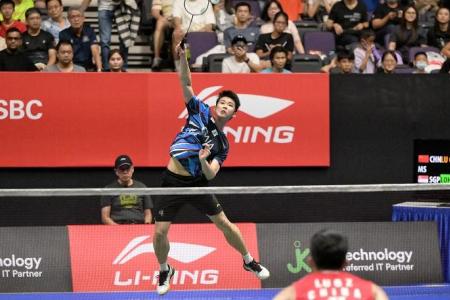Loh Kean Yew’s dance for dominance
Badminton player Loh Kean Yew explains the appeal of the rally
Every day Loh Kean Yew tests rubber. He leaps, darts, brakes, lunges, back-pedals. After three or four weeks, depending on how far he goes in the draw, his shoes get a little worn and he has to change them.
If they don’t grip properly, or help him brake perfectly, it’s going to affect the most important part of his badminton life.
The rally.
The rally is as unscripted as a conversation. It has no set time – Loh, an aggressive player, remembers a 59-shot one he played – and no prescribed design. As he readies to serve, the Singaporean has a “rough plan” but his rival has his own one. This is a two-way interrogation conducted sometimes at a few hundred kilometres per hour.
“During the rally you adjust to whatever situation,” says Loh, who hopes to challenge for a medal at the Paris Olympics. “And sometimes it’s just instinct, because you don’t have time to properly think, think, think. And anyway it might also cause overthinking.”
If a rival reads his plan, he must be flexible. “There is a constant change of tactics, and it happens very fast, because the game is so fast.”
The rally is a deceitful dance. It is intelligent repartee. It is a lifetime of spin practised, videos watched, kilometres run, reflexes trained, all distilled to a handful of spectacular seconds. When it starts it feels like a blur as ideas are tossed across the net. But is he playing to his strengths or to his rival’s weakness?
“Both,” says Loh in a best-case scenario. Often it just depends on the style of a rival. “My strength could be his strength. For example, he’s good at defending and I’m good at attacking.”
So then?
Then, he laughs, “we stay patient and see who lasts”.
Every rally is connected to the previous one. Every one is a valuable strand in a tapestry which we call a game. So many things matter, especially confidence.
“So if you’re a defender, when you defend, defend, defend, and you keep losing the point, obviously your confidence goes down. If you are the attacker, you keep going for the kill, but you can’t kill and in the end you tire yourself out and you make mistakes.”
Some players deliberately walk slowly between rallies. They ask for a spot of sweat to be mopped and for a shuttle to be changed. Oxygen is inhaled, mind games are played, rhythm is broken, conspiracies are hatched. Once the rally begins, Loh, the world No. 10, is watching the shuttle, his rival’s movement and his stroke. Where his opponent’s racket aims is a clue.
Players will go where the rally takes them. Ten shots or 80. Sometimes legs get heavy, patience starts to slip away and fatigue can play a role. “They take bigger risks because they are tired. They want to take a gamble. Go big or go home.”
Very occasionally players may deliberately extend a rally. A rival may win the first game and then trail badly in the second. “Then,” explains Loh, “they just want to give up on that set (to reserve energy for the third game). And you don’t want them to give up on that set yet. Then you try to prolong it.”
For the spectator the rally is entertainment, for the player it is a nuanced, no-touching wrestle for control. Sometimes the skill is so subtle – the tiny additions of spin, the minor variations in pace – and the momentum shifting so rapidly that we cannot gauge the intensity of a duel.
“Being in control,” says Loh, “is constantly changing. He’s in control. Then suddenly I’m in control. (Then) suddenly he’s in control. So these are probably the small things that might not be seen.”
No one plays the same in a rally. There is touch, disguise, power, attack. But the “best, best, best player”, says Loh, can do what is required when it matters. “They can do the right thing at the right time using the right strength.”
But what are the best rallies?
Loh thinks and repeats the question. “Which ones are best?”
Then he grins.
“Whichever gains the point.”
Get The New Paper on your phone with the free TNP app. Download from the Apple App Store or Google Play Store now


